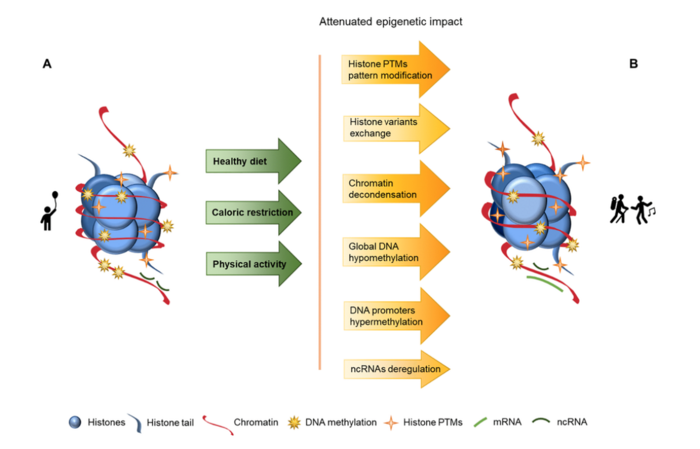“In this review, we describe how aging impacts epigenetics and how nutrition and physical exercise can positively impact the aging process, from an epigenetic point of view.”

Credit: 2023 Rajado et al.
“In this review, we describe how aging impacts epigenetics and how nutrition and physical exercise can positively impact the aging process, from an epigenetic point of view.”
BUFFALO, NY- May 10, 2023 – A new review paper was published in Aging (listed by MEDLINE/PubMed as “Aging (Albany NY)” and “Aging-US” by Web of Science) Volume 15, Issue 8, entitled, “How can we modulate aging through nutrition and physical exercise? An epigenetic approach.”
The World Health Organization predicts that by 2050, 2.1 billion people worldwide will be over 60 years old, a drastic increase from only 1 billion in 2019. Considering these numbers, strategies to ensure an extended “healthspan” or healthy longevity are urgently needed.
In this new review, researchers Ana Teresa Rajado, Nádia Silva, Filipa Esteves, David Brito, Alexandra Binnie, Inês M. Araújo, Clévio Nóbrega, José Bragança, and Pedro Castelo-Branco from the ALFA Score Consortium, University of Algarve Campus Gambelas, William Osler Health System, and Champalimaud Centre for the Unknown discuss their present study that approaches the promotion of healthspan from an epigenetic perspective. Epigenetic phenomena are modifiable in response to an individual’s environmental exposures, and therefore link an individual’s environment to their gene expression pattern. Epigenetic studies demonstrate that aging is associated with decondensation of the chromatin, leading to an altered heterochromatin structure, which promotes the accumulation of errors.
“In this article we explore aging and its associated epigenetic changes as well as how these changes may be delayed or reversed through nutrition, caloric restriction and sustained physical activity, as schematized in Figure 2.”
Canonical histones are replaced by histone variants, concomitant with an increase in histone post-translational modifications (PTMs). A slight increase in DNA methylation at promoters has been observed, which represses transcription of previously active genes, in parallel with global genome hypomethylation. Aging is also associated with deregulation of gene expression – usually provided by non-coding RNAs – leading to both the repression of previously transcribed genes and to the transcription of previously repressed genes.
“Age-associated epigenetic events are less common in individuals with a healthy lifestyle, including balanced nutrition, caloric restriction and physical exercise. Healthy aging is associated with more tightly condensed chromatin, fewer PTMs and greater regulation by ncRNAs.”
Read the full review: DOI: https://doi.org/10.18632/aging.204668
Corresponding Author: Pedro Castelo-Branco
Corresponding Email: [email protected]
Keywords: epigenetics, aging, nutrition, caloric restriction, physical exercise
Sign up for free Altmetric alerts about this article: https://aging.altmetric.com/details/email_updates?id=10.18632%2Faging.204668
About Aging-US:
Launched in 2009, Aging publishes papers of general interest and biological significance in all fields of aging research and age-related diseases, including cancer—and now, with a special focus on COVID-19 vulnerability as an age-dependent syndrome. Topics in Aging go beyond traditional gerontology, including, but not limited to, cellular and molecular biology, human age-related diseases, pathology in model organisms, signal transduction pathways (e.g., p53, sirtuins, and PI-3K/AKT/mTOR, among others), and approaches to modulating these signaling pathways.
Please visit our website at www.Aging-US.com and connect with us:
- SoundCloud
- YouTube
- LabTube
Click here to subscribe to Aging publication updates.
For media inquiries, please contact [email protected].
Aging (Aging-US) Journal Office
6666 E. Quaker Str., Suite 1B
Orchard Park, NY 14127
Phone: 1-800-922-0957, option 1
###
Journal
Aging-US
DOI
10.18632/aging.204668
Method of Research
Commentary/editorial
Subject of Research
People
Article Title
How can we modulate aging through nutrition and physical exercise? An epigenetic approach
Article Publication Date
20-Apr-2023




